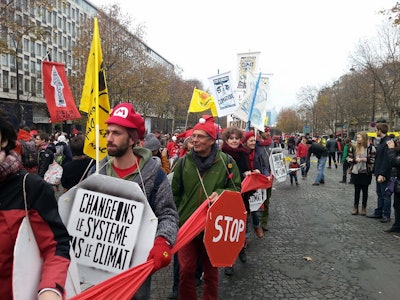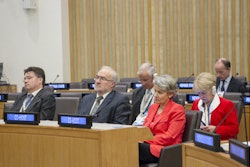
The landmark agreement struck by more than 190 nations in Paris introduces a new international approach to limiting climate change, with all countries rather than just developed industrial nations joining in to pledge to curb their greenhouse-gas emissions, according to The Wall Street Journal.
But whether the deal reaches its goal—all but eliminating fossil fuels and carbon-emitting economic activity in the second half of the century—still depends almost entirely on domestic will within each individual country to overhaul how energy is produced and consumed and transform the way its economy works.
“We’re on the cusp of getting the ambition we need,” said Edward Cameron, a policy adviser for We Mean Business, a business coalition advocating for action on climate change. “This means no backsliding on what’s been agreed.”
That is because the core of the deal is a collection of voluntary plans by each country to address climate change within the context of its own domestic economic and political situations. Those plans aren’t legally enforceable—a condition some countries including the U.S. insisted upon—although the deal did legally bind countries to develop a common set of reporting standards and a review process to strengthen efforts to reduce greenhouse-gas emissions over time.
To read more, click here.
Editors Insight: The Paris climate change accord does not signal a magic cure for reducing greenhouse gas emissions worldwide, but it does signify global recognition of the challenge and a commitment among both developed and developing nations. It’s easy to find shortcomings in the agreement since it does not include enforcement mechanisms, but getting 190 countries to agree on such a big goal is an achievement.
The food and beverage industries have long recognized the importance of reducing greenhouse gas emissions and these industries deserve credit for the pioneering role they have taken in demonstrating a willingness to improve the global environment. This agreement provides some degree of overdue recognition that will encourage the food and beverage industries to continue their already impressive sustainability investments.
The most optimistic expectation going forward is stronger private sector investment in renewable energy, alternative energy and sustainability enhancing technologies.
Critics of the agreement have noted that aggressive government regulation of industry will serve to politicize these efforts, and there is merit to this argument. In addition, if certain countries ignore their commitments and become havens for polluters, they will undermine efforts by committed countries and potentially sabotage any progress made under the agreement. The agreement calls for developed countries to send more than $100 billion annually to developing ones to support their efforts. An ongoing monitoring and dialogue among all stakeholders is important. 12-14-15 By Elliot Maras

















